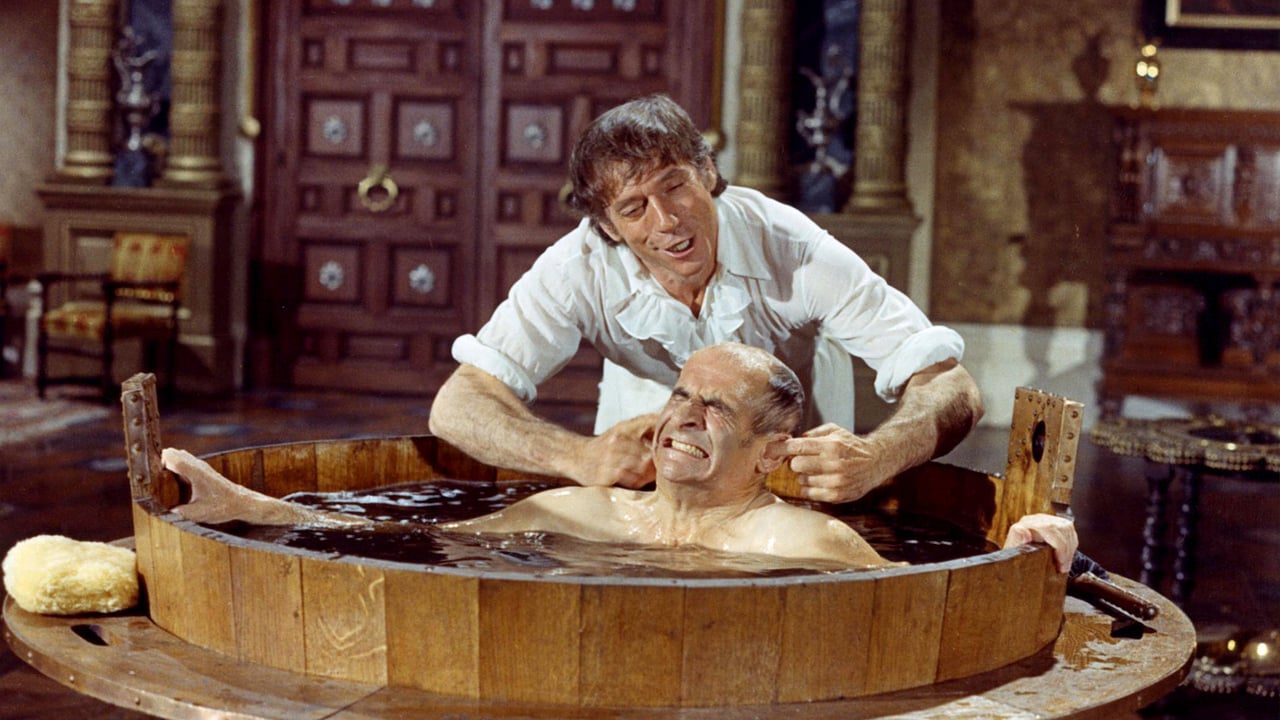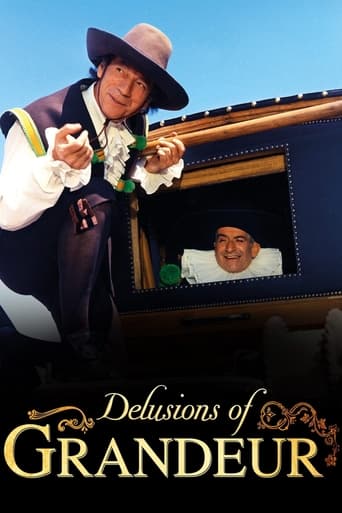

In 1970, director Gérard Oury was the king of French popular comedy, having conquered the highest box-office summits with "The Sucker" and "The Great Stroll", both starring Louis de Funès and Bourvil. "Third time's a charm" Oury probably figured when he was planning to feature the memorable duo in a comical adaptation of Victor Hugo's "Ruy Blas", a tale of ambitions, convoluted plots, schemes and masquerades set in the flamboyant world-ruling Spain of the 17th century. Oury had the reputation, the capability and more than anything, the dough.But it was fate that took a stand against him, for the great Bourvil failed the whole world of cinema and died in the most untimely fashion in 1970 at the age of 52, leaving French cinema orphan of his likability. But De Funès was at the peak of his career and he needed a partner, not a sidekick, a real co-star. Gérard Oury was at loss until Simone Signoret suggested her husband, Yves Montand. Montand was a singer and dancer but his romantic aura earned him many memorable leading man roles; it was time for him to display the natural comedic talent he owed to his music-hall days. And Montand pulls a superb performance as De Funès valet.There's a natural complementarity different from the one with Bourvil, but with comedic potential as well. Bourvil was the 'lovable' average guy and De Funès the bossy one with a hair-trigger temper, but Montand is everything De Funès is not, whether in looks or personality. De Funès can manipulate him but the novelty is that he can envy him secretly. The two opposite attract as they say, Saluste is the King Minsitry's of Finance, Louis de Funès at his cruelest, meanest and scroogiest, he's like a live-action version of French famous comic-book caliph Iznogoud or Disney's Prince John, spotting a ridiculous hat with two green bobbles. When he comes to take the taxes, and a poor official laments that the people are poor Saluste turns his head and the bobbles hit the guy's face "That's normal, poor are meant to be very poor and rich very rich".Now, this was the plain-villainous role De Funès' needed, but never vileness at the expenses of sympathy, even something as ridicule as his bobbles makes him look more grotesque than villainous. And Montand is the handsome, resourceful and clever valet who only plays the fool to fool his master, but he's not to be overshadowed by De Funès, he can be romantic, hell he can even be funny. The scene where he starts dancing the flamenco much to his master's displeasure is simply Montand establishing his presence, and the scene where Saluste orders him to walk on his knees because he doesn't want to look smaller is De Funès feeling literally towered."Delusions of Grandeurs" starts with the perfect casting choice and then all it takes is a sweeping and swashbuckling story that would have made Cecil B. De Mille jealous. This is a summit of French comedy as one of the first high-budgeted movies made for the sake of laughs, the opening sets the tone, it's fast-paced, exhilarating and served by a score made by Michel Polnareff and that supposedly spoofs Western Spaghetti's themes, spoof or no spoof, in its own right, it's one of the most memorable scores of French cinema. And thanks to the budget, to the setting in the magnificent palaces of Alhambra or in the desert of Almeria (to represent the Barbarians region), Oury gives a tremendous believability to his story, enhancing the two comical and romantic effects, but ultimately even the romances are vehicles to the comedy.The plot involves the ambition of Saluste to take vengeance from the Queen (a German young girl) who just deprived him from his rank and fortune, by using Blaze as a foil, but Blaze falls in love with the beautiful girl and just when you think the material will turn into sappiness, there's a wonderful quiproquo involving the duenna, a severe no-nonsense killjoy played by Alice Sapritch, Dona Juana. One of the best twists of the film is to see the heart of this old hag melt and falling in love with Blaze, and culminating in an expected strip-tease moment, one of the funniest scenes of French cinema. This is De Funès' film, no doubt about it, but you also remember it from the performances of Montand and Sapritch, who even steal from him the final laugh.Of course, the film has aged a little at times, but this also features Louis de Funès at the top of his game as an irredeemable greedy man, representative on the corners one's ambition might drive him, it's the culmination of a certain vision of French cinema with comedy being the most important genre. The film didn't reach the six-million breach which was disappointing by Oury's standards but it was a huge popular success, full of immortal quotes, one of them being the 'Gold' scene playing on the rhyming effect of "Or" with common French words and some slapstick moments borrowed from Looney Tunes or spoof movies, like the bath scene, Saluste checking how a one-eyed man can see and his gasping at the film's climax, not to mention a few camel laughing and an Arab proud of having the most mundane desert jail.And when criticized for making a popular cinema (yes, this was the New Wave days said) Oury came back with the best answer, refusing the use of this word "From Euripides to Anouilh ou Pinter, who ever dreamed to play in front of empty chairs? Making message movies is fashion, my message is to make people laugh." When people laugh, they're not mean. How true is that, and how great it is to laugh at mean people, especially when they're played by De Funès.
... View MoreAs all other comments have pointed out, this is a real delight, thanks to top acting and directing talent, great dialogs, clever parody of Morricone and spaghetti westerns... I know the film by heart, as it has been on french TV at least once a year since it was made: 30 years ago! I'd really be interested in knowing what kind of entertainment value people from the USA, people who are neither living near France nor in a french speaking environment, find in this movie. Because it seems so very specifically french to me...And I noticed that more or less every comment here comes from someone who's got either a language or some other European strings attached helping them getting the movie's humor.Louis de Funès is a cult figure in France, he is an artist apart from everyone else. I love him, and I would be so curious to know what effect he, as well as that french comedy style, have on someone who doesn't have my cultural background...Anyway, to anyone who has the opportunity to see this film, it's quite a curiosity, unique in its own way!
... View MoreYves Montand at his best, even for those, who deny intellectual appearances with him. De Funes tries to overtake him with his abilities, and the spectator is the winner. Unfortunately this movie had been squeezed in the mills of cold war time, but don't exaggerate. Turn your color-button up and enjoy.
... View MoreLet's not forget that this movie is a wonderful retelling of Victor Hugo's social drama "Ruy Blas", featuring social themes he used in other fictions - Montand uses the beginning of Ruy Blas' long speech, "Bon appétit, messieurs" at one time. But this retelling is madxe for laughs and succeeds without forgetting the social comments and, if crude at times, it actually works. A classic of its times - but try Hugo's writings, you IMDB folks, you might be surprised by his power and before-his-time awareness and c
... View More